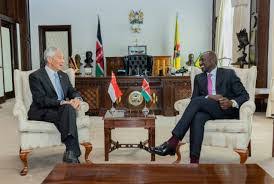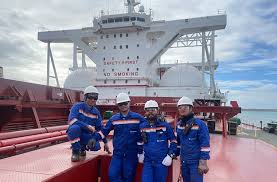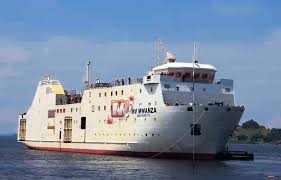Kenya Sets Sail: How Strategic Partnerships are Forging a Generation of World-Class Seafarers

Kenya President Dr William Ruto with Singapore Head of State Singapore Head of State meet on Maritime Partnership. (Photo/ Courtesy)
By Andrew Mwangura
Email, thecoastnewspaper@gmail.com
A new dawn is breaking for Kenya’s maritime sector. The recent, transformative training partnerships signed by Mount Kenya University and Bandari Maritime Academy are more than just paperwork; they are the engines powering Kenya’s ascent as a formidable player in the global maritime industry.
As the world grapples with an acute shortage of qualified seafarers, Kenya—with its strategic location and young, ambitious population—stands at the threshold of unprecedented opportunity. These strategic deals provide the navigational charts to seize it.
Mount Kenya University’s landmark memorandum of understanding (MoU) with the Abu Dhabi Maritime Academy arrives at a critical juncture.
The global industry faces a projected shortfall of hundreds of thousands of seafarers, driven by an aging workforce and the rising technological demands of modern shipping.
Kenya is uniquely positioned to fill this void while creating sustainable, high-value employment for thousands of its citizens.
The true significance of these partnerships, however, is not merely institutional prestige. For the aspiring Kenyan seafarer, they represent tangible pathways to internationally recognized certifications, competitive global salaries, and careers that span the globe.
The collaboration between MKU’s academy in Malindi and its Abu Dhabi counterpart will align curriculum with the highest international standards, ensuring Kenyan graduates are not just qualified, but sought-after. This standardization is crucial in a profession governed by the International Maritime Organization’s strict conventions.

By partnering with established global academies, our institutions gain immediate access to best practices and cutting-edge training methodologies that would otherwise take years to develop alone.
Similarly, Bandari Maritime Academy’s new partnership with the Regional Maritime University of Ghana fortifies our national capacity through African collaboration.
It acknowledges that maritime excellence on the continent requires a collective effort. Such networks create a powerful ecosystem, benefiting students through exchanges, faculty through shared research, and the entire industry through a larger, standardized pool of qualified professionals.
The economic implications for Kenya are profound. Maritime careers offer some of the most lucrative opportunities available to our youth, with remittances from seafarers contributing significant foreign exchange.
Beyond individual earnings, a robust maritime training sector attracts international students, generates revenue, and creates auxiliary jobs in coastal regions like Malindi, where MKU’s academy brings world-class education and economic activity directly to the coast.
These initiatives are the bedrock of Kenya’s Blue Economy agenda. A well-trained maritime workforce enables Kenya to evolve from a passive observer to an active leader in global shipping.
Our seafarers will not only crew international vessels but will also be the backbone of our domestic port operations, coastal shipping, and offshore exploration.
Critically, these partnerships are future-proof. The MKU-Abu Dhabi agreement’s focus on areas like artificial intelligence ensures Kenyan seafarers are prepared for the automated, technologically advanced ships of tomorrow. This is not just about meeting today’s standards, but about leading tomorrow’s industry.
Ultimately, the embedded knowledge exchange and trainer development create sustainable capacity. We are not just sending students abroad; we are importing world-class expertise to uplift our entire educational framework, positioning Kenyan maritime academics as contributors to global knowledge.

For the young Kenyan looking toward the horizon, these deals mean enhanced employability, dignified professional standing, and a passport to the world. They represent a defiant rejection of complacency in favor of strategic, global excellence.
As these partnerships are implemented, they chart a course to a future where Kenyan seafarers are recognized not just as participants, but as indispensable professionals in the world’s oceanic economy.
This is more than institutional progress; it is national empowerment, launched from our shores.




